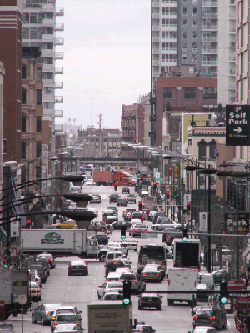Every year, metropolitan Chicago is wasting $7.3 billion in lost time, fuel, productivity and environmental damage as a result of excess traffic congestion. To remain globally competitive, we cannot continue to hemorrhage resources that could be invested in more efficient mass transit, better schools, increased job creation, and business attraction. This report provides a mandate for change by defining the scope and severity of the cost of congestion in our region. The report’s findings indicate clear criteria to guide future solutions.

Criteria for solutions ...
The cost of a solution must not exceed the cost of congestion
Simply put, even if we spend $1 billion today to solve regional congestion, we’ll still be ahead by $6.3 billion.
Solutions must balance the needs of business, society, and the environment
Congestion costs the region’s freight industry some $1 billion a year, and impedes the creation of some 87,000 jobs. Individuals bear the burden in their pocketbooks, too, through wasted time and fuel. The environment suffers through deteriorating air quality and increased greenhouse gas emissions. Successful congestion solutions will address all of these issues.
Solutions must be regional in scope
Traffic jams may occur most often in Chicago , but a lot of that traffic originates in surrounding counties. Solutions must address congestion in our region as a whole, not just in downtown Chicago .
Solutions must address congestion on expressways and arterial roads
Gridlock is not confined to expressways. Indeed, traffic is often worse on arterials — and heavy traffic on arterials causes greater environmental harm. Solutions must not simply divert traffic from expressways to arterial roads.
Solutions must address wasted time as well as fuel
Climbing gas prices are hurting individuals across Chicagoland, but lost time is costing them 19.5 times more than wasted fuel. Solutions should help people reduce the amount of time they spend on the roads, period. This will have the added benefit of curbing frequent visits to the pump.
Conclusions
This analysis has revealed several underlying dynamics of the region’s congestion:
-Congestion impedes Chicagoland’s global competitiveness.
-Congestion is a regional problem that must be solved regionally.
-Congestion hurts individuals and their families, who waste time in traffic and
money on fuel.
“Solutions” that impede business growth are not the answer. “Solutions” that focus only on Chicago’s downtown or the region’s expressways, at the expense of arterial routes, will stunt growth and may increase pollution. “Solutions” that reduce transportation choices, rather than expand them, will cause more problems than they fix. Reducing congestion must improve the region’s environmental sustainability, social equity, and economic competitiveness.
Better choices about land use and development patterns would reduce the number of miles we need to drive. More information on traffic patterns would give people more choices about when to drive. Some element of pricing would motivate people and businesses to make informed decisions about how important driving is to them, and at which time of the day. However, increasing driving costs without first improving transit alternatives can disproportionately harm those members of society who already struggle to make ends meet.
If metropolitan Chicago is to remain a globally competitive region, local and state leaders must be willing to act on new approaches to planning, financing and constructing transportation infrastructure. Whatever the menu of strategies the Chicago region adopts and implements, solutions will require regional commitments and coordination.
Real solutions to the region’s congestion are possible and at hand. Quantifying the exact nature of congestion, as this report has done, is the first step toward a healthier, more efficient, and less wasteful Chicago region.
Return to the main page of Moving at the Speed of Congestion.